LANCE ARMSTRONG: EXCLUSIVE INTERVIEW
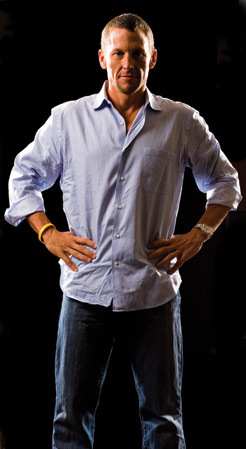
It?s been a long time since Lance Armstrong spoke to us ? some time back in the day, we were added to his infamous blacklist. The blacklist never existed, he now informs us, in this exclusive interview. He also denies that he?s having a mid-life crisis, keeps us in the dark about whether he?ll ride the 2009 Tour, and tells us he doesn?t even know his own VO2 Max figures.
This interview first appeared in the November 27 issue of Cycling Weekly, and is a companion piece to the exclusive Lance Armstrong feature in the current edition of Cycle Sport. Since the interview, conducted in Austin, Texas, on November 17, Armstrong has admitted that he intends to ride the Tour de France, although race organisers ASO have yet to confirm his participation.
CW: Is it a problem if you don?t ride the Tour?
LA: It depends. I?m not foolish - It?s the biggest bike race in the world, you have a certain amount of exposure that comes with that if you?re talking about the global issue. I?m arguably not the best person to talk about it.
If it comes with other hostility and distractions. Do you want to subject yourself and the cause to a lot of distraction?
We?ll just have to see. I?m in no hurry and I don?t think they [Tour organisers ASO] are either. Everybody needs to calm down and get into the season and decide.
But I love the event. I?ve said it many times. I?ve won it a lot. I know what it means to me and what it means to win it.
Get The Leadout Newsletter
The latest race content, interviews, features, reviews and expert buying guides, direct to your inbox!
But I?m not trying to play games with them or with you or with anybody.We?ll just have to wait and see.
Will that be a success in terms of US fans? American sports fans don?t know the Giro d?Italia as well as the Tour de France.
The American people, from New York, San Francisco, Montana or wherever, they know the Tour. It?s all on the table and we understand its significance.
ASO have conditions for entry. Do you have any?
No. The only conditions I would hope we could have are safe conditions. Meaning I don't want to ride down the road and get hurt.
I don?t want to deal with that. I wouldn't look forward to going into that environment. The roads are open and the spectators are there, anything can happen. It would be bad for that to happen. It would change cycling. I think they?d be forced to change the dynamic between the athlete and the people, which would be a shame.
I don?t need to have a love fest for three weeks, I?m not asking for that. I think [ASO] understands what the race means to the sponsors and media. Patrice Clerc [ex-ASO chief] ? did he understand that? No he didn?t. He believed the Tour was bigger than any individual or group of individuals. He believed that the Tour was the star.
But that is not the case in sport. I think we all agree that sports grow and thrive because of athletes. That?s the way it is. They need each other, but the athletes are the ones that really drive the interest in events.
Not that I have any control over this, but I would encourage the UCI and ASO to follow the lead of the French Open at Roland Garros and not send samples to Chatenay Malabry.
With this comeback are you trying to rewrite history?
How so?
In terms of the fact that the sport has been talking about the dirty generation of the 1990s and 2000s. It makes you look bad.
But why was [this year?s Tour] perceived as being cleaner? Speeds were just as high. But that happens ? people evolve, training evolves, roads evolve, equipment evolves.
Garmin, Columbia, the French teams have been outspoken in the anti-doping fight?
I don?t think it?s fair to highlight Garmin and Columbia without highighting CSC and Astana.
I won?t buy the argument that those programmes are any cleaner than Riis or Johan. I think Damsgaard is as comprehensive if not more than them.
Some of it is PR. The people who work hardest and have the most talent win.
Am I trying to rewrite history? No. I don?t have a problem with the history. Were there questions? Absolutely. Was there criticism, scepticism? Absolutely.
But I was around not only for the seven Tours, which wasn?t easy to do if you are cheating. But I?ve been around longer than that.
I put my nose in front of the peloton and stayed at the front from 1992 all the way through. My performance never suffered or diminished. You can see in the latter years I would not have risked my family?s reputation, my savings, my foundation, all those people who believe in that cause. I wouldn?t have risked that.
I left with a clear conscience. I went to bed in the last three years, totally fine. Did it strike me that I could still do it, wanted to do it, still felt strong? Yeah.
If people like yourself or other journalists want to pooh pooh that and say that this is ?bullshit?, you might. I feel bad for you, though.
Interview continues below
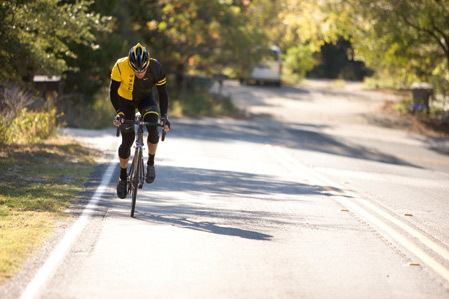
Photo by Walter Pieringer
Are you undergoing a mid-life crisis? A lot of men in their late 30s think they can still do what they could when they were young.
I don?t know the answer to that. I read that Savoldelli said I?d gone out and done the tests and could still do it. But I don't know that.
I don't believe you.
I don?t have any climbs in the US that I?ve tested on before. And I?ve not been to Europe yet.
I?m not bullshitting you, I don?t know. Ask me in Nice. On my roads.
You like control, you?re organised and you?re focused. I can?t believe you?d do something like this unless you knew you could still win bike races.
The only thing I have is a lot of motivation. And I feel good. I?ll tell you, when I go out training every day, I feel very strong, I recover very well, and I have the motivation of 98, 99, 2001, 2000.
Did you see the positive press the Garmin and Columbia teams have had in the last year, and think, ?I?d like a piece of that??
It?s different kinds of press. Columbia got press because they won the most races. Which is the right kind of press. In my opinion, the best situation is to be hardworking and successful. The subtext is, we?re clean and here?s the proof.
I don?t believe it?s better to stand up all the time and say, ?we?re clean, we?re clean, we?re clean? and have moderate success on the road.
I think for the team, for the fans and for the sponsors, you have to be successful, ultimately. The Columbia model, to me, because it?s a winning model, and oh yeah, it?s also a clean programme, is the way to go.
What?s your VO2 Max?
Today? I?ve no idea.
What was it?
I don?t know.
You don?t know?
I did some tests back when I was 16.
You don?t know your VO2 Max?
I haven?t done a test in a long time.
What was it?
The best I can remember, the low 80s.
I saw some recent pictures of you cycling, Your upper body looks much bigger than when you were winning the Tour.
I?m 170 pounds, which is very light for me at this time of year. And there?s not a lot of fat. I usually start the season at 180, I?m 170 now. At the Tour, I?m 164.
Your training plans used to be done by Ferrari.
And Chris Carmichael.
Who does them now?
Chris is still heavily involved. They haven?t been that strict. Gym twice a week. Road rides, Two days of three to four hours, two days of four to five hours.
Interview continues below
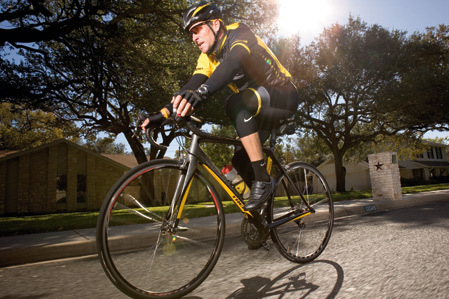
Photo by Walter Pieringer
Are you not working with Ferrari because it looks bad, or because you genuinely think you shouldn't be working with him?
The collaboration was, in the minds of some, a lot greater than it actually was. I?ve been very open that he is a close friend of mine, I?m friends with his wife and family. I?m not going to kick friends out of my life. I don?t work with him.
What?s the highest haematocrit you ever registered?
Er?I don?t know. Maybe? 45, 46.
Haematocrit is a tricky number. In 2003 I started the Tour at 39. It varies greatly depending on effort the day before, dehydration, altitude.
In the last couple of years I?ve been 47 48. It doesn't mean I?ve been out taking illegal drugs. I think starting the Tour at 39, that?s a compelling number.
At the Las Vegas press conference, Greg Lemond talked about the carbon monoxide test for autologous blood transfusions. Would you do those?
Sure if the tests work. Don Catlin has been instructed to do everything available. You don?t want to do something thats not scientifically proven.
Are you OK with blood being stored for future testing?
Absolutely
Are you in favour of retroactive testing?
Yes. They give you the option when you are tested ? can we use your specimen in the future for experiments? I always check ?yes?.
But you didn?t want the AFLD to open up your samples from more recent Tours
They only offered 1999. The others have been tested.
And would you be OK with them being tested again?
They?ve already been tested.
But tested again.
What do you want me to do? Keep testing? The first time they came back clean. That?s not enough? They offered 1999.
But the point is that if new tests are developed, it?s important to go back and test old samples.
That?s the point of storing samples.
What about releasing the results of your physical tests, your power output, your watts per kilo, in the interests of transparency?
The idea is to do that. I?ve not been very good in the past at downloading my SRM data. I read it real time.
Interview continues below
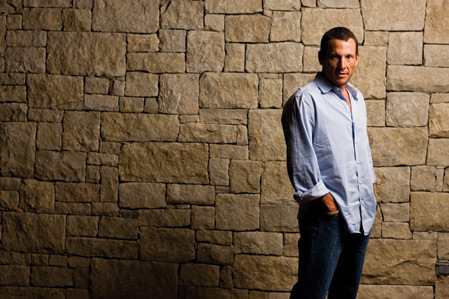
Photo by Walter Pieringer
Do you have any Therapeutic Use Exemptions?
No. Never have.
Never? What about the cortisone?
Well, obviously there was the cortisone.
Would you open up your health book?
In the year 2001, there were two riders without any notes in their health books ? me and Erik Dekker.
Will you open up your blood values record?
That?s for Don Catlin to answer but I?ve told him I?ve got no problem with that.
Have you ever taken EPO?
Yes, during the fall of 1996. Whenever I was ill.
How much would you have won the Tour de France by if the guys behind you hadn?t been doping?
Interesting question. I?ve no idea.
I?m not looking for minutes or seconds.
But you have other riders who got caught, or admitted it, and came back and rode just as fast, without naming names. Which would lead to the conclusion that it?s not so advantageous, that it?s not all it?s cracked up to be. I don?t know. If I look at guys that were caught and served time and came back and rode just as fast and were just as successful?
Are you saying doping doesn't work?
What works is super talent and super hard work. Those are the big factors.
Interview continues below
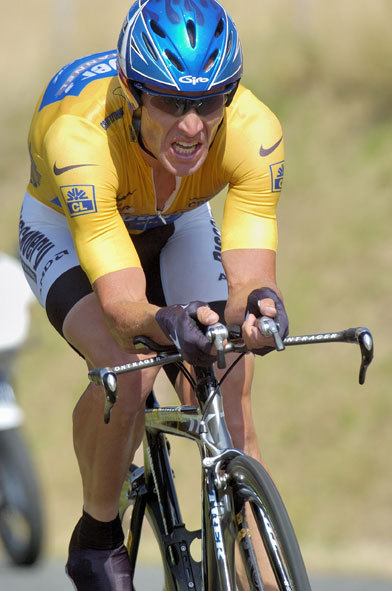
In your Twitter feed, there have been comments about the dope testers, and in your book you are disparaging about them. The comments have a personal edge, and it seems you don?t have much respect for them.
Perhaps it just came across bad. They always come in the morning and we have coffee and shoot the shit.
They?ve got a job to do. Is it an inconvenience? You?re sitting in your kitchen, having your breakfast. Dude, if they came into your house?
?it would be a good thing?
Yes, a good thing, but it would be an inconvenience for you. You?ve never had it happen.
Is it a necessity? Yes. Is it good for sport? Yes. Does it disprove all the doubters? No, but you know what? I fill out my form every day. I?ve got no problem with them knowing where I am every single day.
Are you using any products or training methods that are not in the public domain?
No.
What was your last contact with Dr Michele Ferrari?
A long time ago. I understand that there?s an issue there with consulting on anything to do with cycling. We?re not going to do that.
Would you use your standing in the cycling world to put pressure on the Spanish authorities to release Operacion Puerto information?
My pressure?s not going to achieve anything.
Would you be outspoken about it?
I?d be outspoken as a cyclist. Whoever is in charge must release all the names. It?s not a cycling list it?s a sports list, so absolutely.
Interview continues below
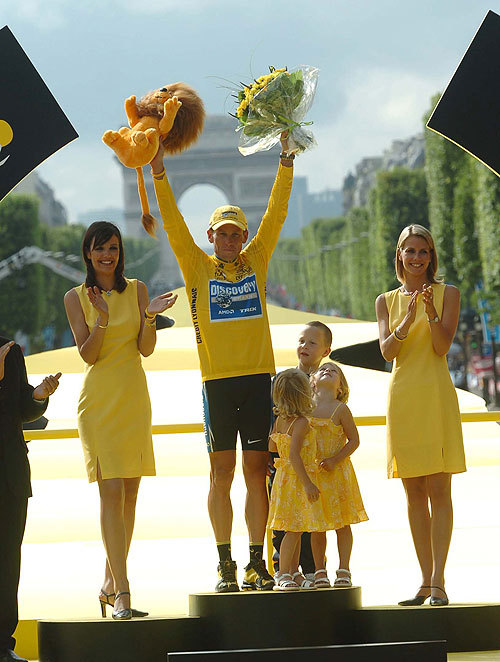
Do you believe that Floyd Landis doped?
No. I think in a normal American court of law, he?s not guilty. Those arbitrations with USADA and CAS are tough. The arbitrators are in the business of arbitrating in favour of the anti-doping agencies. If I was a juror, I don?t think there was guilt beyond reasonable doubt.
Why have so many ex-US Postal riders tested positive or admitted doping retrospectively?
I don't know. We?re not in charge of them when they leave. They never tested positive under our guidance.
People say they weren?t caught because your methods of covering up were better.
No. That?s not true. We had a lot of good riders. We had a great team, great directors. Simply not true.
2000 is a compelling case, when we had the French investigation. The only conclusion they could draw was that the samples were too clean. Too clean.
What do you want me to say? My record stands.
What?s your relationship with Hein Verbruggen?
It?s a good relationship. I haven?t talked to or seen him in years.
You made a gift to the UCI back in the early 2000s to buy anti-doping equipment. How much was it?
Er?Well, I can get you an exact number. Around 25,000 dollars. This was a long time ago.
Was the payment to Verbruggen or the UCI?
The UCI. I made it in the interests of it helping. The UCI is not a wealthy organisation.
Did you consider it a potential conflict of interest?
I didn?t. And if it was, we wouldn?t have done it.
What other financial interests do you have in cycling?
Ownership? SRAM. Very few shares in Trek. But SRAM was my personal money. An investment.
What?s your standard fee for racing?
I don?t know. I can tell you what my standard speaking fee is. Domestically, 150,000 dollars plus travel. Internationally? More. My race fee varies.
Did you ask for half a million dollars to race in New Zealand, as reported recently?
No, I never even heard of that race.
Do you have any financial interest in the holding company of Astana, Olympus Sarl?
No. What?s it called? I never even heard that name.
You haven?t? That?s who you?re riding for next year.
I?m riding for Johan.
Were ASO right to exclude Astana from this year?s Tour?
No. Perhaps on the name alone, yes. But after the changes, Damsgaard coming in, no.
Will Vinokourov be on the team in 2009?
The UCI said he?s not cleared to race. I don?t know. I?d love to give you the inside story but I don't know Vino, I don?t know that situation. Obviously he?s from Astana, and he brought those players to the table even though he?s no longer part of the team. But I think the UCI has a different take on the situation.
He was caught, retired, got a one year ban and has expressed no remorse. When you do something wrong, rehabilitation is as important as the punishment. He hasn?t expressed remorse and denied everything. Do you see that as a problem?
Listen, if he doesn?t believe he did it?
He tested positive for an homologous blood transfusion
If you serve your time, that is all that society asks of you. The rules say, if you?re banned for two years, you serve your time and you come back. That?s why we have prison. That?s why we have speeding tickets. You pay your penalty, serve your time, get put back into society and just as strongly as you talk about rehabilitation you got to talk about forgiveness.
It?s unfortunate we?re still telling these stories, but if people do their time, let them get back to work.
Do you think the rehabilitiation is important?
If somebody cheated and is brave enough to admit that, they should do that.
Sometimes people want to say, ?Lance, we just want to hear you say you cheated?. But why would I f****** lie? I?m not going to do that. Regardless of how much you stand up and scream and jump around on the table, I?m not going to lie to make you happy. I don?t think somebody should make up some shit just so they can be forgiven.
You made enemies readily during your career. Is this still true?
The last few years for me have been more about collaboration and partnership. With the foundation we have to do that. We?re looking for partners. Do you still want to be tough and successful and hold yourself to high standards and effect change? Yeah.
LANCE ARTSTRONG'S ART
Eddy Merckx has got an Expressionist portrait of himself in his office. We once went round to Juan-Antonio Flecha?s house and saw the huge surrealist artwork of Barcelona?s Sagrada Familia cathedral hanging in his front room. But other than that, we?ve seen little evidence that professional cyclists are much into art.
Apart from Lance Armstrong?s house, that is. The walls are a riot of mainly modernist art. He?s a big fan of Pop Artist Ed Ruscha, but there are also 17th century religious paintings, a Francis Bacon, and a Damien Hirst. If there?s any unifying theme to Armstrong?s collection, he buys what he likes, and he likes what he buys.
Revealingly, he seems to appreciate most of all the difficulty of painting. While showing CW his collection, he refers again and again to how hard it would have been to paint. Ironically, he uses a Damien Hirst butterfly painting to illustrate this, which is an unconscious reflection of the way team leaders rely on their domestiques. Whether Armstrong knows that Hirst employs other artists to do a great deal of his studio work or not, we don?t know. We also don?t know if Armstrong ever suffered the claustrophobic angst that afflicted Bacon. We suspect not. But there?s no doubt he?s not doing this just for show, and he has a keen eye for the details in his paintings.
Do you collect art because it?s what rich people do?
I?ve collected art a long time. I buy it because I appreciate it, It?s a little secret hobby of mine. I?ve been collecting art for more than 10 years.
Do you get an emotional response from it?
I?m not educated. I don?t have training in art. I see something that appeals to my eye, I show an interest, buy it, or wish I?d bought it.
Do you like the way it looks or the way it feels when you look at it?
I like the way it looks, I like the way it makes me feel. You have to have an appreciation for how hard it was to do. That Michael Gregory right there, you can see it?s a painting, but step back, it looks like a photograph.
I can appreciate that 17th century Spanish piece painted on wood that's hundreds of years old, nobody knows who painted it, I appreciate the age of it.
I can look at that Damien Hurst ? one, where did he get all those butterflies? Two, how did you get them in that pattern?
And others, I just look at it and think, ?I like it?
You don?t present yourself as an emotional person, but art is an emotional experience.
I?m more emotional than you think. A lot of that comes from my persona on the bike. I?m constantly exposed, you have to have that mask. People don?t like that. I found it works for that job.
My kids will tell you I?m doing underarm farts, running around slapping towels and drinking beer. The whole world doesn?t get to see that.
THE BLACKLIST AND TRANSPARENCY
Armstrong was famous, especially in the later years of his career, for having a ?blacklist? of journalists he wouldn?t speak to, after real or perceived slights. We reckon we made it on in mid-2002, although we managed to get interviews through favoured journalists later one. By the end, it would have been far easier and quicker to list the journalists he would talk to.
But Armstrong now tells us there was no blacklist.
?I never said we had a blacklist. Dan Coyle said in his book that there was a blacklist,? he says.
We ask him to confirm, and there is a silence.
?No. Literally a list? People said we had photographs up. Complete nonsense,? he insists.
But we think he is being disingenuous. Dan Coyle, in his book Lance Armstrong: Tour de Force, does mention the blacklist, while Jeremy Whittle reports that Armstrong?s press officer took photos of offending journalists, including Paul Kimmage, who was critical of the Texan.
The mention of Kimmage during the questions about the blacklist gets Armstrong?s hackles bristling, as shown in the following exchange.
Kimmage said he had his photograph taken. [note: CW acknowledges that this is wrong ? he was reported in Jeremy Whittle?s book Bad Blood as having his photograph taken.
Kimmage is a joke.
He?s a respected sports writer.
Really?
I don?t think he got his picture taken. I didn?t take it.
It?s not going to be a puff piece every time. That?s reality. Do you put them at the top of your list when you have an hour to talk to people, got five people to choose from? No. That?s human. Do you never talk to them? No.
That doesn?t mean we had a wall of photographs. That?s completely not true.
Are you going to talk to the Kimmages, Walshes, Ressiots, the arch sceptics?
Kimmage wrote this thing online which is the most appalling classless, things I?d ever seen. He referred to me as the cancer and said the mission was bullshit. As a cancer survivor, somebody who represents a community of 12 million people in this country, that is f****** insulting.
I would consider a Kimmage interview. I?d ask him to address that blog, which was so insulting.
What about Lemond?
What about him?
Lemond is a thorn in your side now. How can peace be made with him?
I don?t spend a lot of time thinking about Greg.
Did you ever put pressure on Trek to discredit him?
No. Discredit him? Or get rid of his line? Neither.
IN CONCLUSION
Safe to say that Armstrong is no fan of Kimmage, or Lemond. But on examination of his words, there are holes in Armstrong?s arguments.
The Kimmage piece Armstrong refers to is actually the transcript of a radio interview he did on a small Irish station when the comeback was announced. Kimmage did have his photograph taken, although this was observed by Jeremy Whittle, not by Kimmage himself. And Armstrong saying ?I didn?t take? the photograph is a very different thing from saying ?nobody took the photograph?
Armstrong is also denying the existence of a ?literal? list with photographs up on a wall, but this is not the point. The fact remains that there was a long list of journalists he wouldn?t talk to. Call it a blacklist, or call it what you like.
Former US Postal and Discovery rider Michael Barry confirmed to us that there was no physical wall of photos on the team bus, as rumoured by many, but why else would Armstrong?s press agent take mugshots of journalists who?d asked inconvenient questions?
Kimmage himself was unconcerned when we contacted him.
?I regard it as a huge compliment that he thinks so lowly of me,? he said.
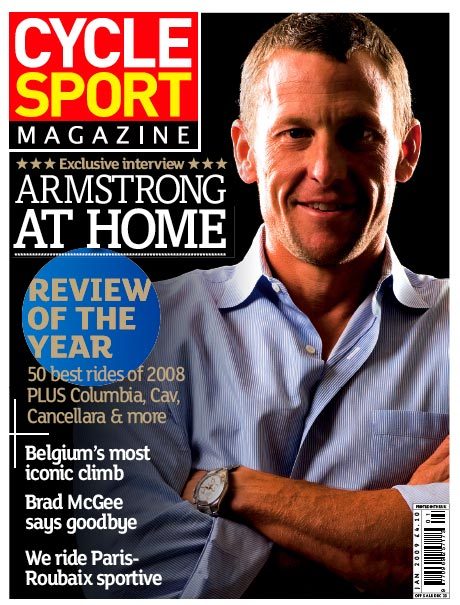
Cycle Sport, January 2009. On sale now
LANCE ARMSTRONG: RELATED LINKS
Armstrong trains with Contador for first time
Armstrong to ride 2009 Tour de France
Armstrong: still no drug-testing program
Armsrong visits Paris but doesn't want to talk about Tour de France
Armstrong speaks to Cycle Sport
Armstrong vs Hincapie at Tour Down Under
Armstrong to meet Tour officials before deciding on participation
Armstrong still playing it cool over Tour
Armstrong says he could not have hoped for a different Tour
Contador to stay with Astana and Armstrong
Lance Armstrong's Tour de France comeback in doubt
Armstrong to ride the 2009 Giro d'Italia
Armstrong rejects offer to re-test 1999 samples
Armstrong knew about six month rule
French offer Armstrong re-test of his 1999 Tour samples
Amrstrong hopes UCI show 'common sense' for Aussie return
Armstrong comeback in Tour Down Under faces possible delays
Watch Armstrong in Vegas 'Cross race
Armstrong confirms Ventoux time trial for 2009?
Armstrong's comeback starts in Australia
Wednesday Comment (September 24)
Contador says riding with Lance could be difficult
UCI president rubbishes Armstrong Tour buyout claims
Bruyneel talks up Armstrong's chances
The Wednesday Comment, Armstrong Edition (September 10)
Tour de France: Lance can race in 2009
Contador: Lance could win eighth Tour
Lance confirms 2009 comeback
Armstrong: No smoke without fire?

Thank you for reading 20 articles this month* Join now for unlimited access
Enjoy your first month for just £1 / $1 / €1
*Read 5 free articles per month without a subscription

Join now for unlimited access
Try first month for just £1 / $1 / €1
Edward Pickering is a writer and journalist, editor of Pro Cycling and previous deputy editor of Cycle Sport. As well as contributing to Cycling Weekly, he has also written for the likes of the New York Times. His book, The Race Against Time, saw him shortlisted for Best New Writer at the British Sports Book Awards. A self-confessed 'fair weather cyclist', Pickering also enjoys running.
-
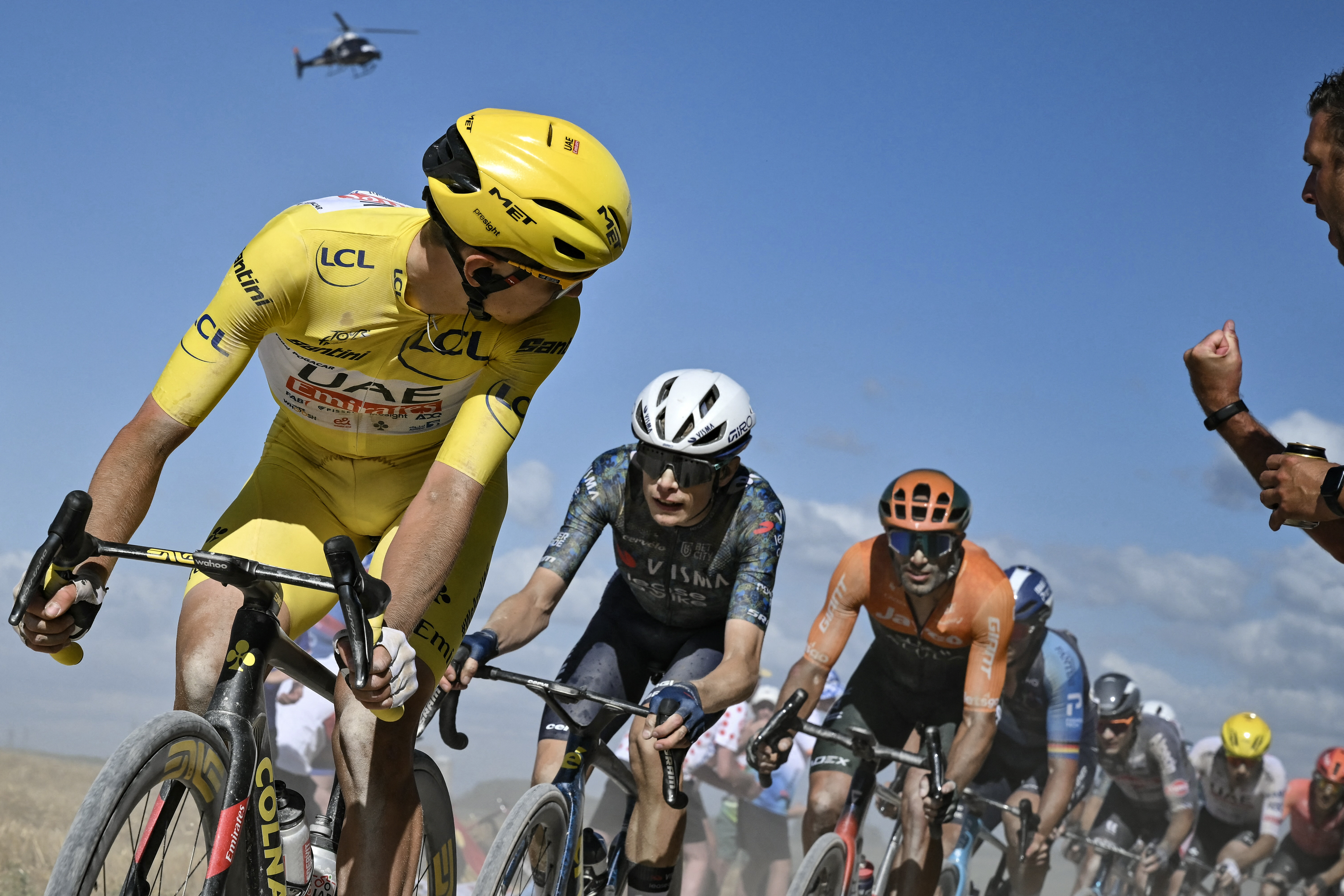 UK government 'recognises concerns' but ignores calls for Tour de France to remain on free-to-air television
UK government 'recognises concerns' but ignores calls for Tour de France to remain on free-to-air televisionA petition which sought to change the way the Tour de France was categorised by the government in order to keep it free to watch from 2026 has been responded to
By Adam Becket
-
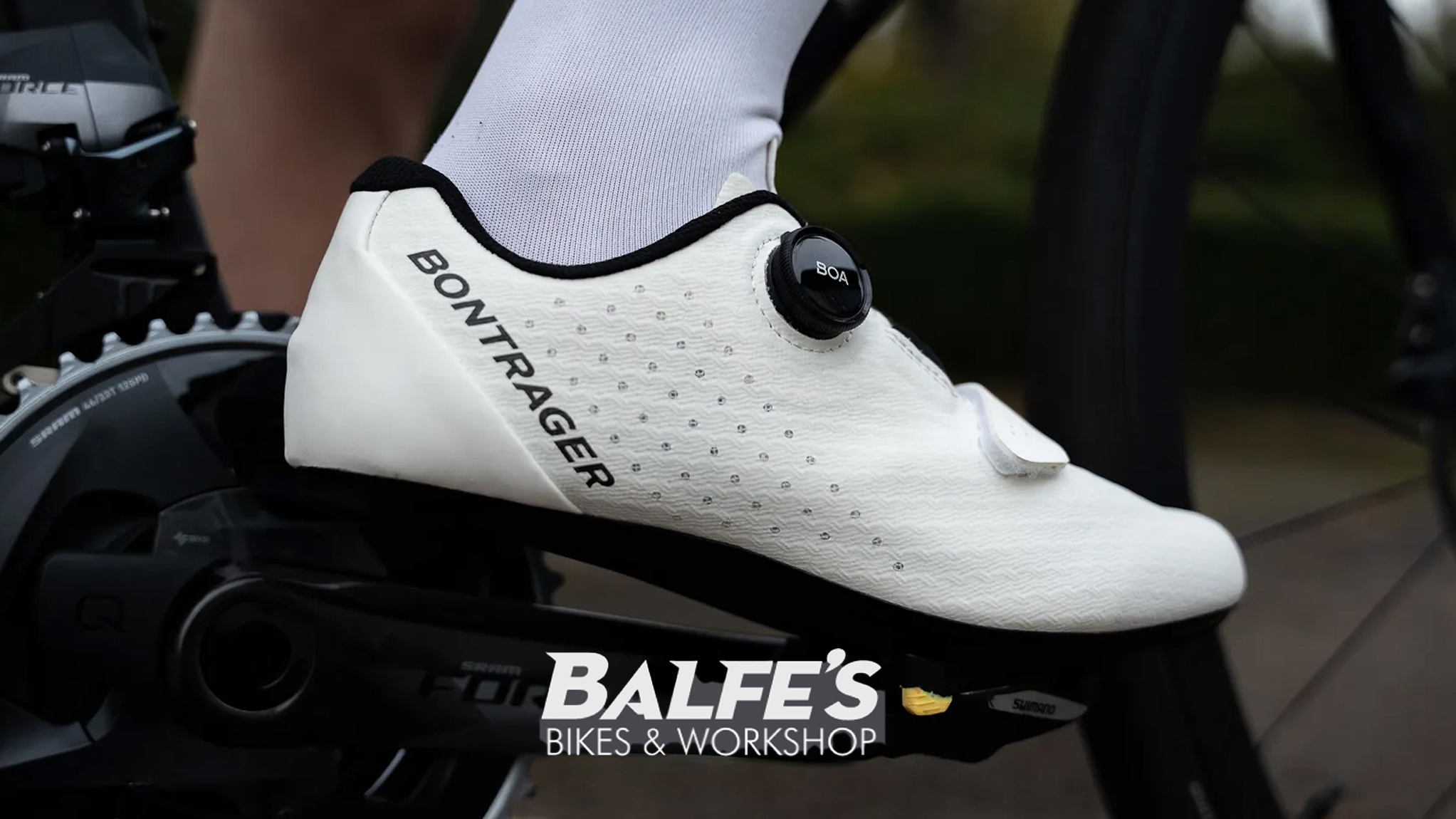 Gear up for your best summer of riding – Balfe's Bikes has up to 54% off Bontrager shoes, helmets, lights and much more
Gear up for your best summer of riding – Balfe's Bikes has up to 54% off Bontrager shoes, helmets, lights and much moreSupported It's not just Bontrager, Balfe's has a huge selection of discounted kit from the best cycling brands including Trek, Specialized, Giant and Castelli all with big reductions
By Paul Brett